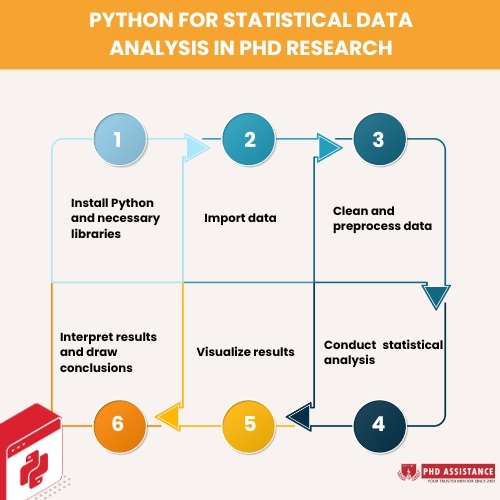How to use Python to conduct regression analysis in management PhD research
Regression analysis with Python
Regression analysis is a statistical technique in Python used to model the relationship between a dependent variable and one or more independent variables. Leveraging libraries such as NumPy, Pandas, and scikit-learn, Python facilitates seamless regression modelling. Data preprocessing involves cleaning and organizing datasets, while visualization tools like Matplotlib aid in understanding variable relationships. Scikit-learn’s linear regression module simplifies model creation, and advanced techniques like polynomial regression and regularization are accessible—evaluation metrics like R-squared and Mean Squared Error gauge model performance. Python’s flexibility and rich ecosystem make it a preferred choice for regression analysis, enabling insightful predictions and uncovering patterns within data analytics.
Introduction
As a PhD student, statistical data analysis is an essential component of your study, and Python is a sophisticated computer language that may assist you with this work. Python provides a plethora of modules and tools dedicated to statistical analysis, making it a popular option among academics. Python allows you to run a broad variety of statistical studies, ranging from simple hypothesis testing to complicated machine-learning techniques. Python also has great data processing and visualization features, making it a full data analysis tool.
Check our PhD Data Analysis examples to learn about how we review or edit an article for Data Analysis.
Python for Statistical Data Analysis in PhD Research
Python is a popular programming language for statistical data analysis, with several libraries and modules dedicated to the task. Here are some general guidelines for using Python for statistical data analysis in your PhD research:

1.Install Python and necessary libraries:
Python and several libraries for statistical data analysis, such as NumPy, Pandas, SciPy, Matplotlib, and Statsmodels, must be installed.
2.Import data:
You may import your data into Python after installing the relevant modules. Pandas libraries may be used to read data from many sources such as CSV, Excel, or SQL.
3.Clean and preprocess data:
You may need to clean and preprocess data before studying it. Pandas and NumPy may be used to edit data, fill in missing values, and eliminate outliers.
4.Conduct statistical analysis:
Statsmodels and Scikit-learn packages may be used to perform Qualitative statistical analysis, such as hypothesis testing, regression, clustering, and machine learning.
5.Visualize results:
After you’ve completed your statistical analysis, you may use libraries such as Matplotlib and Seaborn to show your findings in the form of charts, graphs, and plots.
6.Interpret results and draw conclusions:
Finally, depending on your research proposal questions and hypotheses, you must analyze your findings and form conclusions.
Regression analysis in management PhD research
Regression analysis is a powerful statistical tool widely employed in management PhD research to examine relationships between variables and make predictions. This method is particularly valuable for exploring the intricate dynamics within organizational settings and identifying key factors influencing managerial outcomes.
In the context of management research, regression analysis facilitates the examination of relationships between independent and dependent variables. Independent variables, often representing factors such as leadership styles, organizational culture, or external market conditions, are assessed for their impact on dependent variables, which might include performance metrics, employee satisfaction, or financial indicators. The technique helps researchers quantify the strength and direction of these relationships, shedding light on the factors that significantly contribute to or impede certain managerial outcomes.
Moreover, regression analysis enables the identification of potential causal relationships, allowing researchers to move beyond mere correlation. By understanding the degree of influence each independent variable has on the dependent variable, scholars can discern which factors play a pivotal role in shaping managerial phenomena. This knowledge is crucial for developing nuanced and targeted managerial strategies that address specific organizational challenges.
Additionally, regression analysis aids in predictive modeling, offering researchers the ability to forecast future trends based on historical data. This predictive capability is invaluable for managers seeking to anticipate changes in the business environment or assess the likely impact of strategic decisions.
While regression analysis provides valuable insights, its application in management PhD research design requires careful consideration of various research methodological aspects, such as variable selection, model specification, and potential confounding variables. Researchers must also be mindful of the assumptions underlying regression analysis and employ appropriate techniques to validate their models.
Check out our study guide to learn more about How to format your Research Proposal.
Conclusion:
In conclusion, employing Python for regression analysis in management PhD research enhances the precision of statistical modelling. Leveraging the statsmodels library, researchers can seamlessly investigate relationships between variables. Through careful data exploration, variable preparation, and model fitting, Python facilitates a comprehensive understanding of the studied phenomena. The regression summary provides crucial insights, including coefficients and statistical significance, empowering researchers to draw robust conclusions. This approach not only contributes to the empirical foundation of management research but also exemplifies the efficiency and versatility of Python as a tool for quantitative analysis in the academic domain. Ultimately, Python’s integration into research methodologies enhances the rigour and depth of management PhD investigations.
About PhD Assistance
Writing research proposals for PhD degrees is the main emphasis of PhD Assistance. These papers are important for the application process and are utilized by many international institutions to decide which applicants will be accepted into DBA/Doctoral programs. They have helped students from a number of nations, including the UK, USA, Netherlands, Australia, UAE, Dubai, Kenya, Nigeria, China, and Russia, and they help frame these proposals in accordance with established requirements. They ensure that consumers receive unique papers by closely adhering to university rules and implementing a zero-tolerance attitude against plagiarism.
References
- Massaron, Luca, and Alberto Boschetti. Regression analysis with Python. Packt Publishing Ltd, 2016.
- McNulty, Keith. Handbook of regression modeling in people analytics: with examples in R and Python. CRC Press, 2021.
 Previous Post
Previous Post
